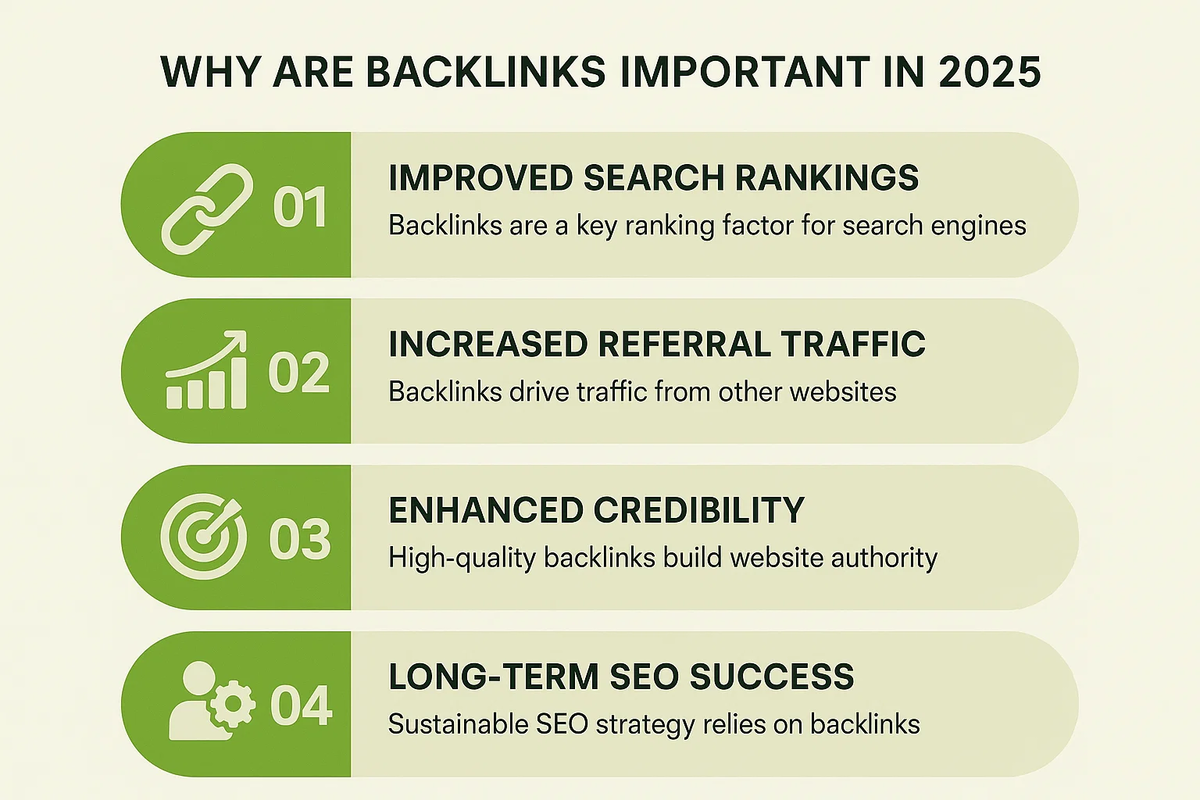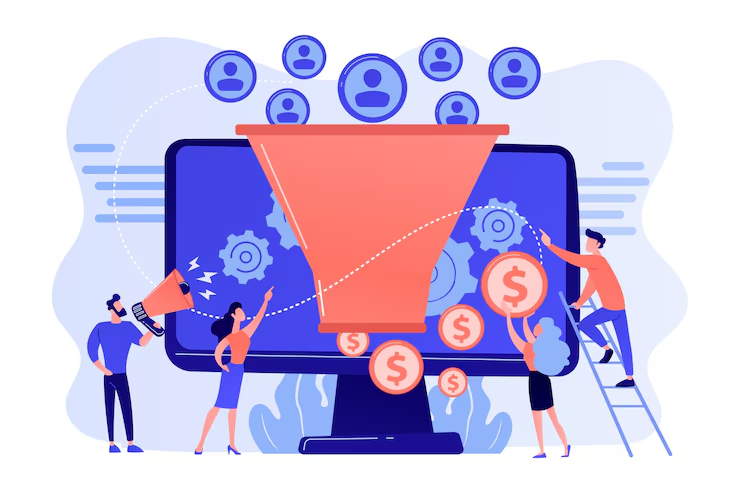Backlinks have been and will continue to be one of the most critical elements of SEO. In 2025, backlinks remain a powerful ranking factor that can propel your website’s authority and visibility. Search engines like Google consider backlinks as "votes of confidence" from other sites, signaling to them that your content is valuable and trustworthy. However, simply earning backlinks is not enough; learning how to get backlinks the right way has become more important than ever.
In this guide, we’ll explore how to get backlinks for your website in 2025. We’ll cover proven strategies, from manual methods to content-driven approaches, while ensuring that your backlink strategy is ethical and effective.
Why Are Backlinks Important in 2025?
Backlinks play a crucial role in determining the credibility and authority of your website, just like the best SEO reporting software helps in tracking and measuring those backlinks. In 2025, they are still considered one of the most powerful ranking signals by search engines, alongside using a noindex tag for pages you don’t want to be indexed.

A website with high-quality backlinks is more likely to rank higher in search engine results pages (SERPs). But it’s not just about the number of backlinks; it’s about the quality and relevance of those backlinks.
In fact, backlinks help search engines in multiple ways:
-
Improving Domain & Page Authority: Websites with high-quality backlinks generally rank higher because these links signal trust to search engines.
-
Boosting Organic Rankings: Backlinks are signals of trust and authority. Pages with more backlinks typically climb the SERPs faster.
-
Increasing Referral Traffic: Backlinks from reputable sources can drive significant traffic from relevant websites, a key element for any SEO website builder strategy.
-
Speeding Up Indexing: Google and other search engines crawl and index new content faster when it is linked from trusted domains.
Given these benefits, it’s clear that backlinks continue to play a crucial role in SEO strategy in 2025. So, let’s dive into how you can earn them effectively.
2 Best Ways To Get Backlinks
The best way to get backlinks for your website in 2025 involves a combination of strategies, ranging from manual outreach to creating high-quality content that others want to link to. These methods should be implemented thoughtfully and aligned with the needs of your audience and search engine algorithms.
1. Guest Blogging: A Time-Tested Strategy
Guest blogging is one of the most reliable and effective ways to get backlinks in 2025. By contributing high-quality, valuable content to well-established blogs within your niche, you not only help those sites offer new insights to their readers but also earn valuable backlinks.
How to Get Backlinks Through Guest Blogging:
-
Find Relevant Blogs: Use tools like BuzzSumo or Google search operators to find authoritative blogs that accept guest posts in your industry.
-
Pitch Quality Content: Craft content that’s both informative and relevant to the blog’s audience. Ensure your post adds value, offers new insights, or solves a problem.
-
Include a Natural Backlink: When writing your guest post, include a link back to your website. Ideally, the link should be contextual and naturally placed within the content rather than being forced.
Guest blogging is not only about the link—it’s also about building relationships within your niche, which can lead to further collaboration opportunities.
2. Influencer Outreach: Leverage Authority in Your Niche
Influencer outreach continues to be one of the most effective ways to get high-quality backlinks. Influencers often have large followings and significant authority within their respective industries. When they link to your website, it can drive traffic and provide a valuable backlink.
How to Get Backlinks Through Influencer Outreach:
-
Identify Influencers: Use tools like Instagram, LinkedIn, or Twitter to find influencers in your industry who have a substantial following and engagement.
-
Craft a Personalized Message: Reach out to the influencers via email or social media with a personalized pitch. Highlight how your website or content can be valuable to their audience.
-
Provide Shareable Content: Make it easy for influencers to link to your content by providing them with resources, blog posts, or infographics that would appeal to their followers.
Working with influencers helps to not only get backlinks but also build your online presence and authority, much like an SEO company would do with advanced AI SEO software. Influencer endorsements can drive more traffic to your site and improve your SEO.
Explore Our Digital Marketing Services!
How to Create Backlinks Manually?
Manual backlink creation involves proactive efforts to reach out to website owners, contribute content, or engage in other strategies to secure backlinks. While this process takes more time and effort, it can yield more authentic and higher-quality backlinks.
1. Directory Submissions
Although directory submissions have fallen out of favor with SEO practitioners, submitting your website to reputable business directories can still yield beneficial backlinks. These backlinks are particularly valuable for local SEO efforts.
How to Create Backlinks Manually Through Directory Submissions:
-
Submit to High-Quality Directories: Focus on well-known and industry-specific directories, such as Yelp, Google My Business, and niche-specific platforms like Clutch.
-
Provide Accurate Information: When submitting your website to a directory, make sure to fill out all the information accurately and add a compelling business description.
-
Local Directories: For local SEO, ensure that your website is listed on local business directories to improve visibility in location-based searches.
Directories are a great foundational backlink-building strategy, especially for new websites looking to gain initial traction.
2. Resource Pages
Resource pages are curated collections of links on specific topics. These pages provide valuable backlinks to your website if you can get your content featured. Resource page links are highly regarded by search engines due to their contextual relevance.
How to Build Backlinks Through Resource Pages:
-
Search for Resource Pages: Use Google search operators like "intitle:resources + [your keyword]" to find resource pages in your niche.
-
Contact the Website Owner: Send a polite email to the webmaster, explaining why your content would be a good addition to their resource page.
-
Ensure Relevance: Only target resource pages that are directly related to your content to increase your chances of securing a backlink.
Being featured on resource pages can provide long-lasting backlinks from authoritative sources in your industry.
3. Broken Link Building
Broken link building is a highly effective and relatively easy-to-implement strategy. It involves finding broken links on high-authority websites and suggesting your own content as a replacement. This strategy works because webmasters are often eager to fix broken links.
How to Build Backlinks Manually Through Broken Link Building:
-
Find Broken Links: Use tools like Ahrefs, Check My Links, or Screaming Frog to find broken links on relevant sites.
-
Contact the Webmaster: Reach out to the webmaster and inform them of the broken link. Suggest your content as a relevant replacement.
-
Create Link-Worthy Content: Make sure the content you’re offering as a replacement is high-quality and relevant to the page.
Broken link building helps you earn backlinks while also helping website owners maintain the quality of their pages.
How to Build Backlinks Without Spamming?
It’s essential to approach backlink building with caution, much like understanding what is CTA (Call to Action) is when guiding user interactions. Resorting to spammy or unethical practices will not only damage your SEO efforts but could also result in penalties from Google. Here are a few key principles to keep in mind while building backlinks:
1. Diversify Your Link Profile
Having a diversified backlink profile is critical for your SEO health, and using the best SEO reporting tools will help you manage this. Seek backlinks from different types of sources—blogs, forums, directories, news sites, and social media. A balanced link profile appears natural to search engines and reduces the likelihood of penalty risks.
2. Quality Over Quantity
Focusing on building a high volume of backlinks may seem tempting, but quality is much more important to reap the benefits of SEO in the long run, and Centric ensures every link is earned from authoritative sources. One backlink from a trusted, authoritative site is far more valuable than dozens of low-quality links from irrelevant sources.
3. Avoid Black-Hat SEO Tactics
Avoid using manipulative tactics like link farms, private blog networks (PBNs), or buying links from shady sources. These methods are against Google’s guidelines and can lead to penalties or even deindexing.
Backlink Building Strategies: A Quick Reference Guide
Master the art of backlink building with these proven strategies for 2025. Use this guide to efficiently navigate the key techniques that will enhance your website's SEO and online visibility.
| Strategy | Description | Best For | Tools to Use |
|---|---|---|---|
| Guest Blogging | Write high-quality content for reputable blogs in your niche. | Brand exposure, niche authority | BuzzSumo, Ahrefs |
| Influencer Outreach | Collaborating with influencers to gain backlinks through mentions or content. | Brand visibility, trust signals | BuzzStream, Pitchbox |
| Broken Link Building | Finding and replacing broken links on other websites with your content. | Quick wins, content relevancy | Ahrefs, Screaming Frog |
| Competitor Backlink Analysis | Analyzing competitors' backlink profiles to identify opportunities. | Competitive advantage, link gaps | Ahrefs, SEMrush |
| Resource Page Link Building | Getting your content listed on curated resource pages. | Niche authority, referral traffic | Google Search, Ahrefs |
| HARO (Help a Reporter Out) | Responding to journalists' queries to earn media mentions and backlinks. | Media exposure, brand credibility | HARO, Help a B2B Writer |
| Skyscraper Technique | Creating superior content to replace outdated or inferior content on other sites. | High-quality backlinks, content marketing | Ahrefs, BuzzSumo |
| Infographics & Visual Content | Designing shareable infographics and visuals to attract backlinks. | Visual appeal, content virality | Canva, Piktochart |
| Testimonials & Reviews | Providing testimonials to businesses in exchange for backlinks. | Relationship building, trust signals | Email outreach |
| Local Business Listings | Submit your site to local business directories. | Local SEO, community engagement | Google My Business, Yelp |
The Future of Backlinks in 2025 and Beyond
As search engines evolve, so too do the methods for earning backlinks. In 2025, AI and machine learning will continue to play a larger role in evaluating backlinks. Instead of simply counting links, search engines will increasingly assess the quality, relevance, and authenticity of the content being linked to.
While manual backlink creation will remain important, the future of backlinks will focus more on content quality and relevance. The use of artificial intelligence to automate outreach and content creation will allow SEOs to build more scalable and effective backlink strategies.
FAQs: How To Get Backlinks?
How do I build backlinks consistently?
Building backlinks consistently requires a long-term content strategy and regular outreach. Publishing evergreen, high-quality content on a schedule helps attract organic links over time. Repurposing top-performing content into new formats also keeps your link-building efforts fresh and scalable.
Why am I not getting quality backlinks?
If you're struggling to attract high-quality backlinks, your content may not be unique, valuable, or sufficiently targeted. You may also be targeting the wrong audience or using generic outreach messages. Enhance your results by prioritizing relevance, personalization, and relationship-building with the right publishers.
Do backlinks still matter for SEO in 2025?
Yes, backlinks remain one of Google's most important ranking signals in 2025. They help search engines assess the trust and authority of your content in an increasingly AI-saturated web. High-quality editorial links from reputable domains remain crucial for achieving long-term organic visibility.
What’s the fastest way to get backlinks?
The fastest methods include guest posting, broken link building, and niche directory submissions. These tactics offer relatively quick wins when paired with strong content and smart outreach. However, fast backlinks should still be relevant, contextual, and earned through value.
Where can I get backlinks safely?
Safe backlinks originate from authoritative, relevant sources such as industry blogs, digital PR sites, or professional directories. Focus on getting links through guest posts, partnerships, or earned media coverage. Avoid using automated tools, PBNs, or irrelevant sites, as they can harm your SEO in the long run.
Conclusion
Backlinks continue to be a crucial component of SEO success in 2025. By using a combination of guest blogging, influencer outreach, resource pages, and broken link building, you can secure high-quality backlinks that boost your site’s authority and visibility. The best way to get backlinks is to focus on creating valuable content and building authentic relationships within your industry.
Remember, the key to successful backlink building is consistency and ethical practices. Whether you’re just starting or looking to refine your SEO strategy, learning how to get backlinks through content-driven strategies is the surest way to enhance your rankings and online presence.








